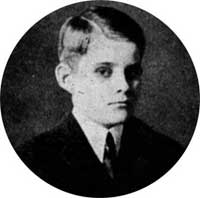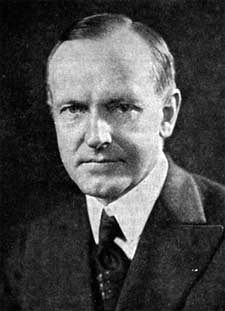Calvin Coolidge became the thirtieth United States President (1923-29) when Warren Harding died suddenly. Coolidge was the sixth Vice President to inherit the presidency. Coolidge was a former Governor of Massachusetts. His calm, shy personality appealed to the attitudes of the time. His common sense and dry wit earned him a reputation for being wise. Coolidge refrained from giving public statements unless they were absolutely necessary, and when he did, they were short and to the point.

 Born in Plymouth, Vermont on July 4, 1872, Coolidge studied law at Amherst College and began a practice Born in Plymouth, Vermont on July 4, 1872, Coolidge studied law at Amherst College and began a practice
in Northampton, Massachusetts. He served in local offices, as a state legislator, and as the mayor of Northampton. He cut taxes, lowered the city debt,
and raised employees pay while adding to his own prestige. While serving in the State Senate he was known for his admiration of businessmen, was happy with the status quo, and promoted the idea that all
that was needed was to wait until the laws that had already been passed had time to make an impact. The Republican Party supported him first for Lieutenant Governor in l9l5 and again in 1918 when he was elected Governor of Massachusetts.

He won national recognition in 1919 when he used state troopers to crush a strike by Boston policemen. Coolidge's stand was firm and expressed in his announcement, "There is no right to strike against the public safety by anyone, anywhere, anytime." He quickly called in the state's militia to deal with the looting and random acts of violence; then he negotiated a successful end of the conflict with the Labor Party organizer, Samuel Gompers.
The Republicans chose Coolidge as Harding's Vice Presidential running mate on the 1920 ticket because he was against political machine politics. When President Harding died suddenly on August 2, 1923, Coolidge's father, a local notary public, administered his oath of office at their family farm in Vermont where Coolidge was vacationing.

 Coolidge began his administration by cleaning up the scandals of the Harding years. In 1924 Coolidge was elected in his own right. The slogan "Keep Cool With Coolidge" summarized the man and his campaign. Coolidge believed that less government interference in business made for prosperity. He became known as "Silent Cal" for his quiet manner and Laissez Faire economics. The term "laissez faire" is a French term for leaving things as they are. Coolidge began his administration by cleaning up the scandals of the Harding years. In 1924 Coolidge was elected in his own right. The slogan "Keep Cool With Coolidge" summarized the man and his campaign. Coolidge believed that less government interference in business made for prosperity. He became known as "Silent Cal" for his quiet manner and Laissez Faire economics. The term "laissez faire" is a French term for leaving things as they are.
Coolidge summed his policies into one sentence: "The chief business of America is business." The rise in the stock market and the business boom of the time was called "Coolidge Prosperity." Coolidge stripped the Federal Trade Commission and the Tariff Commission of their powers, resulting in improved foreign trade. He vetoed bills for aid to America's farmers, which resulted in a coalition of western representatives against him. Their chief argument was that everyone else in the industry was given assistance, but not the people who were providing the natural goods. He also vetoed a bill that would have increased benefits for World War I veterans, and failed to sign one that would have provided for government control of a hydroelectric plant at Muscle Shoals, Tennessee.
He appointed Frank Kellogg and Dwight Morrow to the State Department. It was Frank Kellogg who, along with French minister Aristede Briand, wrote the Kellogg-Briand Pact, which condemned war and made it a criminal act of aggression. Morrow averted a war with Mexico over the potential nationalization of oil and mineral deposits there and helped American businessmen in the Mexican courts and legislature. Coolidge spent billions of dollars on foreign aid to improve the balance of trade.
Coolidge was President during the Roaring Twenties. During his presidency, Babe Ruth hit 60 home runs in one season; boxer Gene Tunney defeated Jack Dempsey; Charles Lindbergh made his famous solo flight across the Atlantic Ocean; and the first talking picture, The Jazz Singer, was released. Prohibition was the law, but the people ignored it, and gangsters became rich selling bootleg liquor. It was a time of spectacular economic growth and far-reaching social change.

Surprisingly, Coolidge chose not to seek reelection in 1928. His most famous words were "I do not choose to run for President in 1928." Instead supported his Secretary of Commerce, Herbert Hoover. Coolidge was the only President besides Hoover to be sworn into office by a former President (Taft). Coolidge retired to write articles and pursue private life. Many deemed his economic practices as contributing greatly to the stock market crash of 1929 and the ensuing depression. Calvin Coolidge died on January 5, 1933, on his family farm in Northampton, Massachusetts while writing his autobiography.
|

